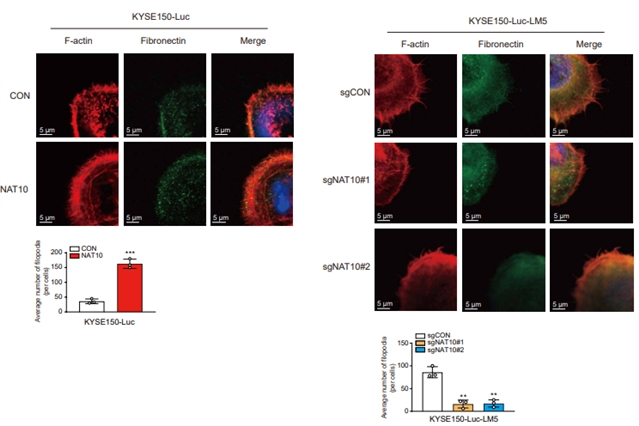
广州医科大学附属第五医院Bin Li团队近期取得重要工作进展,他们研究发现NAT10的赖氨酸2-羟基异丁基化以ac4c依赖的方式促进癌症转移。相关研究成果2023年3月8日在线发表于发于《细胞—研究》杂志上。
据介绍,翻译后修饰增加了蛋白质组的复杂性。然而,关于新发现的赖氨酸酰化修饰的功能和调节机制的知识仍存在空白。
研究人员比较了转移模型和临床样本中的一组非组蛋白赖氨酸酰化模式,并重点关注2-羟基异丁基化(Khib),因为它在癌症转移中显著上调。通过将20对原发性食管肿瘤和转移性肿瘤组织中的系统性Khib蛋白质组分析与CRISPR/Cas9功能筛选相结合,研究人员确定了N-乙酰基转移酶10(NAT10)作为Khib修饰的底物。研究人员进一步表明,NAT10中赖氨酸823处的Khib修饰在功能上有助于转移。从机理上讲,NAT10 Khib修饰增强了其与去泛素化酶USP39的相互作用,从而提高了NAT10蛋白的稳定性。NAT10反过来通过以N4乙酰胞苷依赖的方式增加NOTCH3 mRNA的稳定性来促进转移。
此外,研究人员发现了一种先导化合物#7586-3507,它可以抑制NAT10-Khib修饰,并在低浓度下在体内肿瘤模型中显示出疗效。
总之,这一研究将新发现的赖氨酸酰化修饰与RNA修饰联系起来,从而为人类癌症的表观遗传调控提供了新的见解。研究人员认为,NAT10 K823 Khib修饰的药理学抑制构成了一种潜在的抗转移策略。
附:英文原文
Title: Lysine 2-hydroxyisobutyrylation of NAT10 promotes cancer metastasis in an ac4C-dependent manner
Author: Liao, Long, He, Yan, Li, Shu-Jun, Yu, Xiao-Mei, Liu, Zhi-Chao, Liang, Yi-Yao, Yang, Han, Yang, Jing, Zhang, Guo-Geng, Deng, Chun-Miao, Wei, Xian, Zhu, Yi-Dong, Xu, Tao-Yang, Zheng, Can-Can, Cheng, Chao, Li, Ang, Li, Zhi-Gang, Liu, Jin-Bao, Li, Bin
Issue&Volume: 2023-03-08
Abstract: Posttranslational modifications add tremendous complexity to proteomes; however, gaps remain in knowledge regarding the function and regulatory mechanism of newly discovered lysine acylation modifications. Here, we compared a panel of non-histone lysine acylation patterns in metastasis models and clinical samples, and focused on 2-hydroxyisobutyrylation (Khib) due to its significant upregulation in cancer metastases. By the integration of systemic Khib proteome profiling in 20 paired primary esophageal tumor and metastatic tumor tissues with CRISPR/Cas9 functional screening, we identified N-acetyltransferase 10 (NAT10) as a substrate for Khib modification. We further showed that Khib modification at lysine 823 in NAT10 functionally contribute to metastasis. Mechanistically, NAT10 Khib modification enhances its interaction with deubiquitinase USP39, resulting in increased NAT10 protein stability. NAT10 in turn promotes metastasis by increasing NOTCH3 mRNA stability in an N4-acetylcytidine-dependent manner. Furthermore, we discovered a lead compound #7586-3507 that inhibited NAT10 Khib modification and showed efficacy in tumor models in vivo at a low concentration. Together, our findings bridge newly identified lysine acylation modifications with RNA modifications, thus providing novel insights into epigenetic regulation in human cancer. We propose that pharmacological inhibition of NAT10 K823 Khib modification constitutes a potential anti-metastasis strategy.
DOI: 10.1038/s41422-023-00793-4
Source: https://www.nature.com/articles/s41422-023-00793-4
Cell Research:《细胞研究》,创刊于1990年。隶属于施普林格·自然出版集团,最新IF:20.057
官方网址:https://www.nature.com/cr/
投稿链接:https://mts-cr.nature.com/cgi-bin/main.plex
